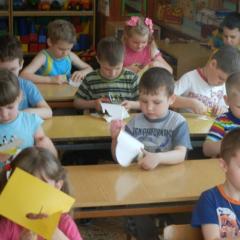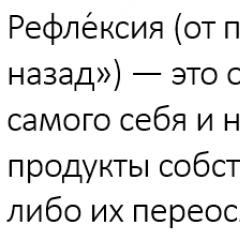Emphasis on the word “reflection” (9 letters). What is reflection, what does psychology say about it and how to reflect profitably. Reflection, where is the emphasis?
The placement of stress in words, including the word “reflection,” occurs during school and student education. How to put the correct emphasis in the word “reflection”?
reflection xia, -And
This word consists of 9 letters. The emphasis in the word “reflection” falls on the fifth letter - e. Try to remember this in order to get rid of incorrect pronunciation and thereby enrich your oral speech.
You are on the page for the word “reflection”. On this page you will get an answer to the question - how to correctly emphasize the word “reflection”? That is, you will learn the correct pronunciation of the word “reflection” according to the orthoepic norms of speech culture. You can get more information about the word “reflection” by using the buttons to go to our other dictionaries. We are very glad that you visited our spelling dictionary; we hope that the information you received about placing stress in words, including the word “reflection,” was useful to you. We look forward to your new visits to our resources.
1) Good afternoon, dear colleagues! I am glad to welcome you to my master class on the topic:"Reflection of students in lessons in elementary school."
2) Updating master class
Dear colleagues, spring has arrived, the sun is warming, beautiful, small, delicate butterflies have appeared. You each have three of them. Please choose one and place it on your palm. And I will tell you one legend.
There lived a wise man in the world who knew everything. But one person wanted to prove the opposite. Holding a butterfly in his palms, he asked: “Tell me, sage, which butterfly is in my hands: dead or alive?”
And he himself thinks: “If the living one says, I will kill her, if the dead one says, I will release her.”
The sage, after thinking, replied:
What do you think the sage answered?
3) "All in your hands". It is important that in our hands the child feels
loved, beautiful, needed, and most importantly - successful.
Today I am in your hands, like this butterfly, if you like my master class and you find it useful to know about methods, techniques, ways of conducting reflection among students in elementary school lessons - this will mean to me that my work is not in vain.
4 )The word reflection comes from the Latin reflexio - turning back
S.I. Ozhegov’s dictionary states that in the word reflection the emphasis should be placed on the syllable le.
Reflection is a person’s reflection aimed at analyzing himself (self-analysis) - his own states, his actions and past events.
5)6) Purpose: Today I will introduce you to specific options for conducting reflection in lessons in elementary school.
7) Psychologists especially emphasize that the formation and development of a child’s spiritual life is associated, first of all, with reflection.
8) Traditionally, psychology distinguishes several types of reflection: Communicative, Personal, Intelligent.
9) When interacting with a student, I use, depending on the circumstances, one of the types of educational reflection, reflecting four spheres of human essence:
1. physical (had time - did not have time);
2.sensory (feeling: comfortable - uncomfortable);
3.intellectual (that I understood, that I realized - that I did not understand, what difficulties
experienced);
4.spiritual (became better or worse, created or destroyed oneself and others).
Basic ways of teaching reflection:
Oral discussion
Written survey
A pictorial or graphic representation of the changes occurring with the student during the lesson
10) Reflection can be: individual, group
In my class, reflection allows the student to realize his own identity, individuality and uniqueness. Since each child manifests himself in those ways of activity that are characteristic of his individuality. This approach corresponds to the semantic content of the concept of “education” as the formation of an image of one’s own “I”.
11 . Call. Today we will work in 4 groups.
I suggest saying hello to all those
who was born in winter, summer, spring, autumn.
Who came in a good mood.
12) Let's say "Hello" with our hands!
Let's say "Hello" with our eyes!
Let's say "Hello" with our mouth -
There will be joy all around!
13) Now I will teach you the multiplication table of 9 by a number.
14) Collective reflection. Phrases from the reflective screen:
You come home today, your parents will ask you questions: think about what you will answer them.
15 . Please take the notes. Work with them.
----“Plus-minus-interesting”, everyone answer the questions.
(I wrote with the letter P - what I liked, multiplying 9 by a number, I thought I would never learn in my life, M - I don’t understand why we have so few fingers, I would multiply and multiply even further, And - Can I teach my sister how to multiply the same way?
16) Assessing your activity and the quality of your work in class.
I answered the questionnaire, I can give it to you.
17) if...(look at the slides)
18) What step has Julia placed herself on?
19) I propose to evaluate my work today. In front of you is a bright, sunny clearing. Not enough butterflies.
I liked the Master class. I will use reflection in my work, let the butterflies of color come.
It wasn't bad. But I don’t know whether I will use reflection among students, let the butterflies fly... colors
I didn’t understand anything on the topic. It was boring, dreary, let the butterflies fly... Colors (Music from a smile)
20) While butterflies are being glued
21) Thank you
Hello, dear readers of the blog site. It is noteworthy that it is reflection that distinguishes people from other living organisms. This phenomenon lies in a person's ability to know about himself, your feelings and experiences.
It is based on the understanding “I am.” depends on how familiar you are with your inner world. Self-knowledge occurs through introspection. Well, read below about what reflection is and how to develop it.
What it is
This term comes from the Latin word reflecto, which means turning back. It’s correct to say “reflection” – emphasis starting with the letter E.
Reflection is the skill of concentrating attention and one’s own thoughts inward: evaluating one’s actions, making decisions, being aware of one’s feelings, emotions and sensations.
This is an understanding of one’s own “I”, constructive criticism of one’s actions, comparing oneself with others for compliance with established norms and rules. A reflective person becomes an outside observer of himself.

The ancestor of this term is considered to be the science of philosophy. She interprets reflection as a tool for thinking about human existence. Socrates wrote that this phenomenon is the only way for internal improvement and spiritual progress through liberation from obsessive thoughts, stereotypes and prejudices.

Pierre de Chardin wrote in his scientific works that reflection is not only knowledge, but also an opportunity be aware of this knowledge. He also noted that this property is available only to man (), who is considered the most developed form of life of all existing on the planet.
Reflection has been studied by many philosophers: their views are similar, so there is no point in writing about them separately.
Reflection in psychology is the basis of self-analysis
By the way, it is the bourgeoisie who want to force us to reflect, plunging our faces into the dark spots of our history (Stalinism, repressions). It is precisely the formation of feelings of guilt that they want to achieve. Everyone has dark spots, but it is beneficial that only we, and not the residents of their countries, focus on this.
There are different ways to reflect
To date, 7 types of reflection have been identified:
- Communicative– allows you to solve problems that arise when interacting with society.
- Personal– used when there is a need for one’s own cognition and correction of consciousness.
- Intelligent– is necessary to find different solutions to the same problem. This is the ability to think variably.
- Philosophical reflection is a tool for thinking about the meaning of life.
- Social– reflections on the topic “what other people think of me.” The ability to see yourself through someone else's eyes.
- Scientific– aimed at researching scientific methods, methods, theoretical justifications.
- In psychology communication reflection - and analysis of the interaction of individuals in society.
Forms of reflection
There are also three forms of reflection, which depend on their focus:

- situational– analysis of what is happening in the present tense (right now I am sitting on the couch and writing this text);
- retrospective– assessment of past experience. This form is useful in that we can draw useful conclusions for ourselves based on inferences about past events (yesterday I was writing a text on the same couch and the TV was on, disturbing me. That’s why today I’m working in silence);
- promising- thinking, planning for the future. Preparing myself for future events (perhaps tomorrow I’ll give myself a day off and just lie on this couch).
How to teach proper reflection
If you want to increase your level of reflection, then use the tips below. To get real results, you need two important conditions - the exercises themselves and their regular execution.
So what should you do? Let's go in order.
Analyze their actions and decisions made.
It is important to do this adequately: try look at yourself from the outside, without assessing yourself and your actions as terrible or, conversely, ideal. The first creates fear of trying something new, the second makes it impossible to see real mistakes.
I'll give you a personal example. how I reflect. So, to begin with, I visualize my own image, but imagine that it is someone else (this makes it easier to avoid the feelings that I might experience towards myself).
I look through the eyes of an outside observer and ask myself the following questions:
- what else could he (the image) do (come up with 3-4 options);
- what mistakes could have been avoided;
- what could not have been done at all;
- what can be added, etc.
Your task is to consider what happened in all possible ways, thereby expanding the boundaries of future experience and increasing the effectiveness of your actions in the future.
Communicate with people as much as possible: you will improve your communication skills, understand others better, and achieve more in conversation.
Ask more questions, test your fantasies. For example, it seemed to you that the silent person was sad. Ask him if this is true? Perhaps he was just wondering how he would celebrate his upcoming anniversary.
It is advisable to meet new people who have a different personality from yours. By perceiving something new, we become more flexible and expand our perception of the world, which makes it easier to cope with life's difficulties.
Every evening scroll through your day.
What events was it filled with? What went well and what didn't work out so well. Remember everything down to the smallest detail. This habit will teach you to see cause-and-effect relationships between your actions and results. People who use this advice rarely ask questions like “How did this happen?”, “Why do I need this?”, “Who is to blame for what happened?”
Well, those who live automatically, once they come to their senses, are horrified by the life situation they find themselves in. This is followed by disappointment, guilt and depression. To prevent this from happening, keep your finger on the pulse (get used to reflecting). May reflection help you!
Good luck to you! See you soon on the pages of the blog site
You might be interested
What is consciousness - just about the complex A social phobe is a person who loves solitude or a sick person suffering from social phobia What is a novella A perfectionist - who is it (the meaning of the word is a person who is subject to perfectionism) and how easy life is for him What is generosity and how to develop this quality in yourself IMHO - what is it (decoding) and what is the meaning of the word IMHO in RuNet Willpower - what is it, the concept of will in psychology and how to develop it What is cruelty - the reasons for its occurrence, can it be justified and how to protect yourself from cruelty What is mercy and how to develop this quality in yourself What are egoism and egocentrism - what is the difference between them



